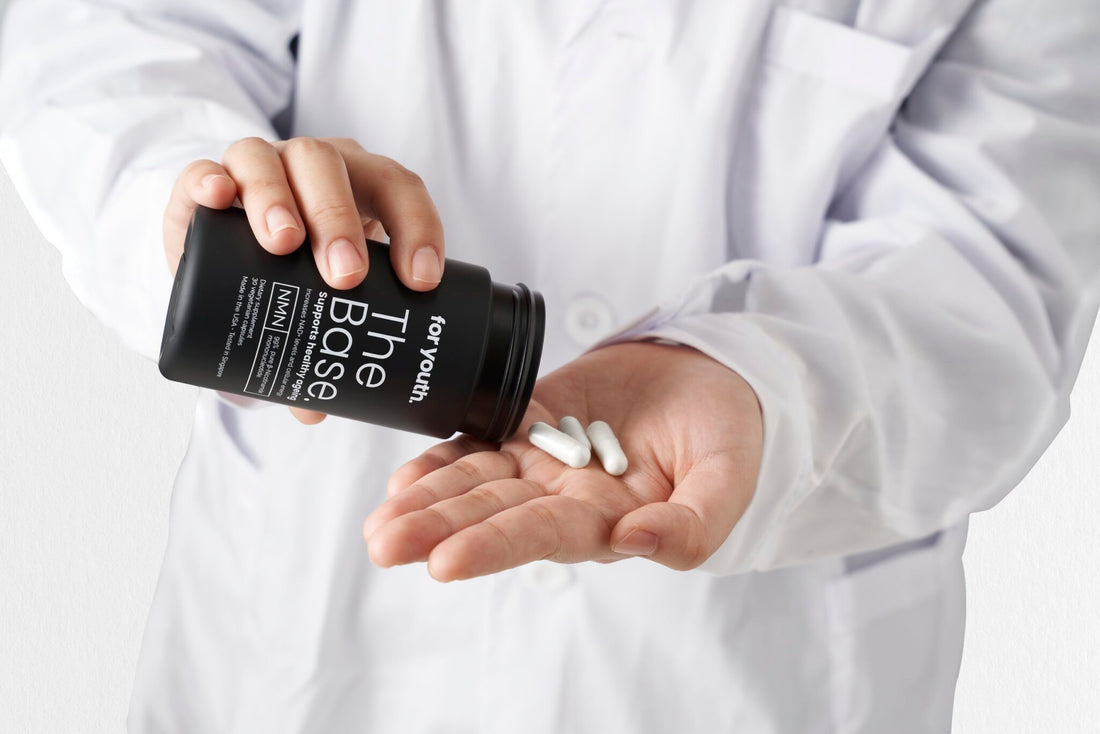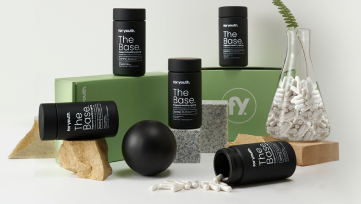How much NMN should I take per day?

A common question
One of the most common questions we get from our community is about the right dosage for Nicotinamide Mononucleotide (NMN). At For Youth, we recommend taking one 250 mg capsule of The Base – NMN a day. To be precise, we actually suggest taking that dose in the early morning.
Even though we recommend one cap daily, surveys are showing us that 40% of our customers are actually taking more than one dose a day. They might have been inspired by prof. David Sinclair, who says he is taking 1000 mg every morning. There are good reasons as to why you might want to consider taking more than 250 mg a day, but let’s first look at why we recommend 250 mg.
While the recommended dosage of 250 mg daily is a great starting point, it's important to understand the wide-ranging benefits that NMN supplementation can offer. NMN has been shown to play a crucial role in the aging process and longevity, potentially slowing down age-related decline.
Beyond its anti-aging properties, NMN has demonstrated promising effects on joint health and arthritis prevention, as well as supporting bone health and potentially preventing osteoporosis. It also contributes to overall cellular health and bolstering the body's natural defenses. Notably, NMN has shown potential in improving brain function and memory, enhancing energy production, and optimizing metabolism for better energy generation.
Some studies even suggest its potential in addressing neurodegeneration and supporting cognitive health. As research continues to unfold, the optimal dosage may vary depending on individual health goals and conditions.

Get The Latest On Longevity Delivered To Your Inbox.
By signing up, you consent to receive For Youth emails
Why For Youth recommends 250 mg
- Most human studies are conducted with doses of 250 mg of NMN and these studies have shown that NMN is effective at this dose. Because we want to stick to scientific research as much as possible, this is the main reason why we are recommending a dose of 250 mg a day.
- NMN is expensive due to the innovative manufacturing process and the safety measure that have been put in place. For Youth wants to make NMN accessible to many people that’s why we are putting 250 mg of this precious material in one capsule. Higher recommended doses would have meant higher prices, whilst a dose of 250 mg is already effective.
However, we do recognise that there might be reasons why you might want to take a higher dose. We can’t give general advise on this, it really depends per person.
Why you might want to consider a higher dose
- A recent study from 2020 has tested the safety of NMN up to doses of 500 mg and no adverse side effects were found. The team of scientists concluded that one dose up to 500 mg is safe and well-tolerated. The team didn’t do any research into higher doses, but that doesn’t rule out that a 1000 mg dose would not be safe.
- NAD+ is needed to repair our DNA and maintain overall cellular health and these levels go down progressively with age. Supplementing NMN can maintain NAD+ levels, but because the levels decline progressively, older people might actually benefit from higher doses. A study conducted on middle-aged mice showed that a dose – equivalent to a dose in humans – of 500 mg a day prevented most age-related physiological decline. This would suggest people that are older than 50 might benefit from higher doses, whilst for people in their 30s or 40s a dose of 250 mg might be sufficient.
- Another factor to consider is body weight. More body mass means more cells, thus more NMN would be needed to raise NAD+ levels. If you are heavier than average, you might want to consider taking an extra capsule per day.
A rule of thumb
Considering what we explained in the sections above, we still stand by our recommended dose of 250 mg – at least when you’re start taking NMN for the first time. If you feel the effects of NMN are limited, your body might require more NMN to adequately raise NAD+ levels and you may want to consider increasing the dose. Besides your personal health status, age and weight would be the best factors to use to decide the dosage you would need. And when in doubt, always seek the help of a health or medical professional.

The future of dosing
Defining the right dose ultimately depends on your personal situation. There is no straightforward answer. Age, weight, spending power, overall health… all these factors might play a role. At For Youth, we are very aware of this challenge and we also see a way forward.
If you have been using NMN for a month or 2 or 3 and you’re only noticing minor effects, you might want to consider increasing the dose. A more scientific way of approaching dosing, would be to regularly do a biological age test. A small improvement or even an increase of your biological age could indicate your dose is too low.
In the near future, For Youth will also launch a bioavailability tests to determine your NAD+ levels. By tracking your levels, you could optimise the dose you need even better.
-FY
FAQ:
How much NMN should I take per day?
The proper daily dosage of NMN (Nicotinamide Mononucleotide) can vary depending on several factors including your age, health status, and the specific goals you are trying to achieve by taking NMN. As of my last update in 2023, there isn’t a universally agreed-upon dosage, largely because research on NMN is still in relatively early stages and is ongoing. However, some general guidelines have emerged based on the available studies and expert opinions.
- General Suggested Dosage: Most studies and experts lean towards a range of 250mg to 500mg per day for healthy adults as a starting point. This dosage is considered safe and potentially effective for boosting NAD+ levels in the body, which is thought to be beneficial for aging and metabolism.
- Clinical Research Dosages: Clinical trials investigating NMN have varied greatly in their dosage, from as low as 100mg per day to as high as 1,000mg or even 2,000mg per day. It’s important to note that higher dosages are typically administered under close supervision in a clinical setting.
- For Specific Goals or Conditions: If you are taking NMN for specific health reasons or conditions, your optimal dosage might differ. Consultation with a healthcare provider is crucial in such cases, as they can offer advice tailored to your health profile and needs.
- Age Considerations: Older adults, who might benefit the most from NMN due to its potential to offset age-related NAD+ decline, might opt for the higher end of the general suggested dosage range, but again, starting slow and consulting with a healthcare provider is advisable.
- Adjustments Over Time: Starting with a lower dose and gradually increasing it while monitoring your body’s response is a prudent approach. This method allows you to find the sweet spot where you notice benefits without experiencing any adverse effects.
Side Notes
- Absorption and Bioavailability: The bioavailability of NMN can be influenced by the form of NMN you are taking (e.g., sublingual, capsules, powder) and possibly your metabolism. This variation might impact how much NMN actually reaches your bloodstream, affecting the ideal dosage.
- Regulation and Quality: Since NMN supplements are not strictly regulated in many regions, the quality and purity of the product can vary considerably. Ensure you source NMN from reputable suppliers.
- Consultation is Crucial: Before starting any new supplement regimen, particularly one involving novel compounds like NMN, it’s important to consult with a healthcare professional, especially if you have pre-existing health conditions or are taking medication.
Nicotinamide Mononucleotide (NMN) has gained significant attention in recent years as a potential anti-aging supplement. Here's an expanded look at NMN dosage, including new sections on statistics, news, and future predictions.
Recommended NMN Dosage
The optimal NMN dosage is typically 250 mg a day, with some opting for up to 900 mg daily. It's advisable not to exceed 1200 mg of NMN per day at the very highest. The ideal dose depends on individual factors such as age, metabolism, diet, and lifestyle.
Starting Dose: 250 mg
For those new to NMN supplements, starting with a lower dose of around 250 mg daily is often recommended. This dosage provides a baseline level of NMN that can help boost NAD+ levels without overwhelming the system.
Moderate Dose: 500-1000 mg
Moderate dosages, ranging from 500 mg to 1000 mg per day, are common among regular NMN users. Research often cites these doses as effective for enhancing NAD+ levels and supporting cellular energy and longevity.
High Dose: 1000mg +
Higher doses, such as 1000 mg to 1200 mg daily, are sometimes used for more intensive support, particularly for older individuals or athletes.
Statistics on NMN Usage and Market Growth
The Nicotinamide Mononucleotide (NMN) market is experiencing significant growth, driven by increasing demand for anti-aging solutions and health supplements. Here are some key statistics:
- The global NMN market size was estimated at USD 115.9 million in 2024.
- The market is projected to reach USD 428.14 million by 2032, growing at a CAGR of 8.2% during 2024-2032.
- Europe held over 30% of the global revenue with a market size of USD 34.77 million in 2024.
- Asia Pacific accounted for around 23% of the global revenue with a market size of USD 26.66 million in 2024.
- The United States NMN market is expected to reach USD 36.58 million in 2024, with a CAGR of 4% from 2024 to 2031.
Recent News and Developments
- Research Breakthroughs: Recent studies have shown that NMN supplementation can improve oocyte maturation in mice with type 1 diabetes. NMN treatment increased oocyte maturation rates and improved oocyte quality by rescuing actin dynamics, reversing meiotic defects, improving mitochondrial function, reducing ROS levels, and restoring histone modifications.
- Potential Applications in Neurodegenerative Diseases: NMN has shown promise in addressing neurodegenerative conditions such as Alzheimer's and Parkinson's diseases. Studies have found that NMN can restore cognition in Alzheimer's disease model rats by increasing neuronal survival and improving energy metabolism.
- Market Expansion: The NMN market is experiencing rapid growth, with increasing demand for anti-aging supplements and products driving sales. This growth is expected to continue, with the market projected to reach USD 707.1 million by 2030.
Future Predictions
As research on NMN continues to evolve, several developments are likely to shape its future:
- Personalized Dosing: Future NMN supplementation may involve more personalized approaches, with dosages tailored to individual needs based on factors such as age, weight, and overall health status. Bioavailability tests to determine NAD+ levels could become more common, allowing for optimized dosing.
- Expanded Applications: As research progresses, NMN may find applications in treating a wider range of age-related conditions, including metabolic disorders, cardiovascular diseases, and neurodegenerative conditions.
- Combination Therapies: Future research may focus on combining NMN with other compounds to enhance its effects or target specific health concerns more effectively.
- Improved Formulations: Advancements in supplement technology may lead to more efficient delivery methods, improving the bioavailability and efficacy of NMN supplements.
- Regulatory Developments: As the market for NMN grows, regulatory bodies may introduce more specific guidelines for its production, quality control, and recommended usage, potentially leading to standardized dosing recommendations.
- Long-term Studies: More extensive, long-term human studies are likely to be conducted, providing clearer insights into the optimal dosage, long-term effects, and potential side effects of NMN supplementation.
As research continues to unfold, our understanding of NMN's potential benefits and optimal usage is likely to evolve, potentially revolutionizing approaches to healthy aging and age-related disease prevention.








